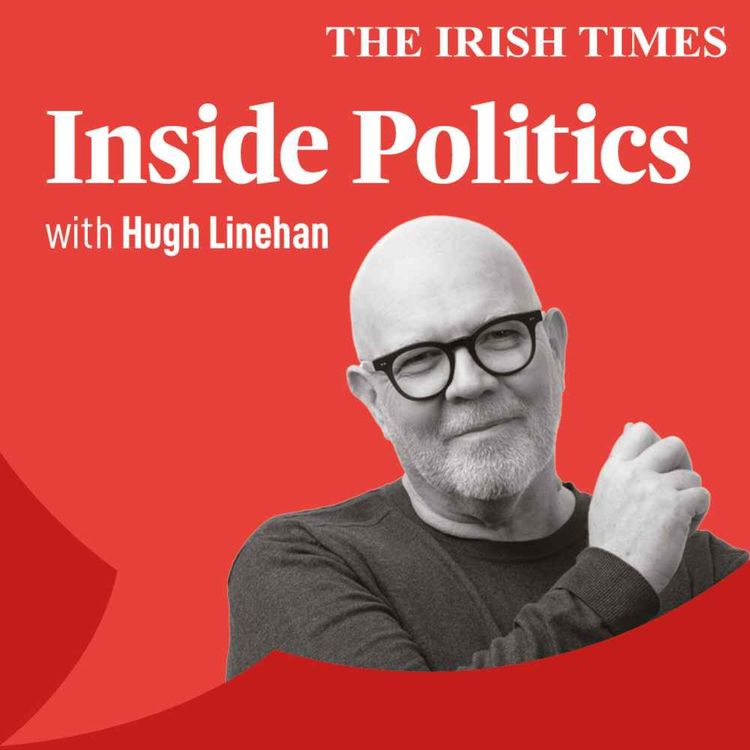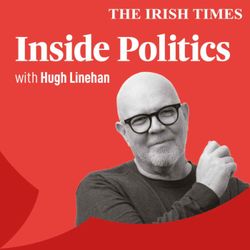Share

Inside Politics with Hugh Linehan
How Morgan McSweeney put Keir Starmer in power
As the head of an organisation called Labour Together, which despite its name '"was all about dividing the Labour party and defeating the left", Irishman Morgan McSweeney handpicked Keir Starmer as the leadership candidate to take on Jeremy Corbyn and the party's left wing in 2020. That is according to Patrick Maguire, co-author of Get In, an entertaining book about Starmer's road to Number 10 and McSweeney's accumulation of power behind the scenes. He talks to Hugh about McSweeney's talent, Starmer's leadership and why the Labour government is struggling to get its message across.
Get In by Patrick Maguire and Gabriel Pogrund is available now.
Would you like to receive daily insights into world events delivered to your inbox? Sign up for Denis Staunton's Global Briefing newsletter here: irishtimes.com/newsletters/global-briefing/
More episodes
View all episodes

Will global turmoil matter to Irish politics in 2026?
46:30|Despite global turmoil, the focus of Irish politics in 2026 is set to remain on matters close to home. Pat Leahy and Jack Horgan-Jones join Hugh to identify the main challenges facing the Government this year, particularly those on the desks of Minister for Housing James Brown, Minister for Transport Darragh O'Brien and Minister for Health Jennifer Carroll MacNeill, and how global events could impinge on those domestic affairs.
How do Greenlanders feel about Trump's 'psychologically needed' takeover?
22:23|US president Donald Trump wants to acquire Greenland, asserting strategic and security needs but also a 'psychological need' to take over the vast, frozen island from Denmark. So how do Greenlanders themselves feel about this idea? Derek Scally is in Greenland's capital Nuuk to find out. He talks to Hugh Linehan about a people whose passion for total independence may have been catalysed by Trump's covetousness.
Could Coalition politics hurt Ireland’s influence in Brussels?
52:25|Jack Horgan-Jones and Ellen Coyne join Hugh Linehan to look back on the week in politics:· The long-anticipated EU-Mercosur trade deal was provisionally approved on Friday, despite the opposition of Ireland, France and three other countries. The deal has been immensely unpopular in Irish political life for a long time, thanks largely to efforts by the farming lobby. But there is now a sense that some figures in the European Commission are disappointed the Government did not make the case for the economic upsides of the deal. · Taoiseach Micheál Martin was in China this week on a four-day visit. Trade was also high on the agenda there, with China eager to import more high-quality food from Ireland. Human rights were mentioned in passing, and there was condemnation by the Taoiseach of Nicolás Maduro’s authoritarian regime in Venezuela, the irony seemingly lost on the Fianna Fáil leader given the country he was visiting.· And the Taoiseach’s party colleague, Minister for Further and Higher Education James Lawless, wants to ditch the one-bed en suites as the Government looks to move towards a co-living model involving communal space for university accommodation. A bathroom of one’s own is a luxury students can go without. Plus, the panel picks their favourite Irish Times pieces of the week:· The Saipan film reopens old wounds for Kevin Kilbane, Seán Moncrieff can’t throw away all those old electronic cables, and boycotting Doonbeg is the least we can do to oppose Donald Trump’s appetite for war.
Venezuela has “emboldened” Trump. Here’s what it means for the world
40:37|After the weekend’s US airstrikes on Venezuela, and arrest of its president Nicolás Maduro by US special forces, The Irish Times’ China Correspondent Denis Staunton has been pondering what it means for the international order, and territorial disputes around the world.“Events in Venezuela have emboldened Trump and we’ve seen him step up his rhetoric around Greenland” he told the Inside Politics podcast.Donald Trump has held no punches in expressing his desire for the US to take over Greenland, which is part of the Kingdom of Denmark.On Sunday, the US president told reporters Washington needed Greenland for “national security” with White House officials suggesting military operations to achieve it aren’t off the table.Denmark’s prime minister Mette Frederiksen said: “If the United States were to choose to attack another Nato country, then everything would come to an end”.And in the Irish Times’ Global Briefing newsletter, Denis writes “If the past year is anything to go by, there is no reason to believe that Europe will put up any kind of fight, military or otherwise”.What other dominos at play within the international order could fall in the wake of Trump’s arrest of Nicolás Maduro?Inside Politics is presented by Hugh Linehan and produced by Declan Conlon, with JJ Vernon on sound.
What are the chances of a border poll in the next ten years?
34:25|For part two of our festive ‘Ask Me Anything’ episode Hugh Linehan is joined on today’s Inside Politics podcast by Jack Horgan Jones, Cormac McQuinn and Ellen Coyne. In this round they tackle listener questions on a border poll, citizen’s assemblies and why we keep on calling our country ‘the State’.Thanks to everyone who listened to the podcast in 2025. From all of us on the Inside Politics team we wish you a very happy new year.
Is there any such thing as a political genius? With Helen Lewis
39:07|This episode was first published in July 2025. You can tell an awful lot about a society by who it labels a genius. You can also learn from who it excludes from that category, who it enables and what it is prepared to tolerate from them. The tortured poet, the rebellious scientist, the monstrous artist, or indeed the tech disruptor.All of these archetypes feature in The Genius Myth, the new book by the journalist, author and podcaster Helen Lewis. She joins Hugh to talk about so-called geniuses, from Elon Musk to The Beatles, the modern influence of concepts like IQ, and what it takes to be a political genius.
Ask us anything: presidential nominations, a Minister for Defence and the centre holding
26:59|Hugh is joined by Jack Horgan Jones, Cormac McQuinn and Ellen Coyne for part one of our traditional festive AMA. This year listeners asked about the presidential nomination process, the influence of party leaders, the need for a dedicated Minister for Defence and the stability of centrist politics. Wishing all our listeners a very Happy Christmas.
What do Irish voters really want? Live at the IFI with Dr Kevin Cunningham
20:38|Dr Kevin Cunningham of TUD is one of Ireland’s most insightful political scientists and pollsters. At the Inside Politics live show in early December he joined Hugh, Pat, Cormac and Ellen on stage at the IFI to talk about Irish voters. What are the issues that really motivate them? Are they driven more by pragmatism or ideology? Today's episode is an excerpt of that conversation.
Why the EU's climbdown on Ukraine aid matters
40:02|It was a difficult week for Micheal Martin and FIanna Fáil with the delivery of the report on the party's failed presidential campaign. Martin's position as leader is safe for now, but questions and doubts remain. In part one of today's podcast Pat delivers his assessment of the state of play within Fianna Fáil. In part two Jack Power reports from Brussels on the ongoing EU summit, where European leaders have agreed on a package of financial support for Ukraine. But the deal came after difficult negotiations and only after Plan A - using frozen Russian assets to pay Ukraine - was ditched. Instead, the EU will fund the package itself. Jack explains how the deal went down and why it was a significant moment within European geopolitics. And finally Pat, Jack and Hugh pick their favourite Irish Times articles of the week, including a warning on antisemitism, a profile of Tommy Robinson and a look at the new season of Emily in Paris.